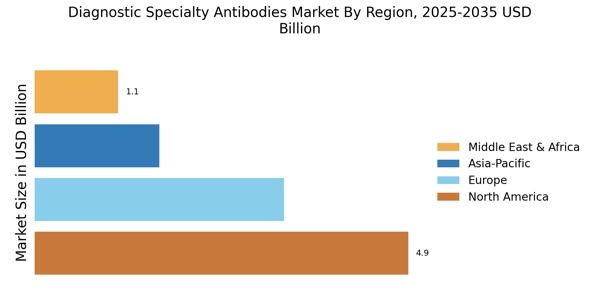Advancements in Biotechnology
Technological innovations in biotechnology are transforming the Diagnostic Specialty Antibodies Market. The development of novel antibody engineering techniques, such as phage display and hybridoma technology, has led to the creation of highly specific and sensitive antibodies. These advancements enable researchers and clinicians to develop better diagnostic assays that can detect diseases at earlier stages. Furthermore, the integration of automation and high-throughput screening methods is streamlining the production of specialty antibodies, making them more accessible. As a result, the market is witnessing an influx of new products that cater to diverse diagnostic needs, thereby expanding the overall market landscape.
Rising Incidence of Chronic Diseases
The increasing prevalence of chronic diseases such as cancer, autoimmune disorders, and infectious diseases is a primary driver for the Diagnostic Specialty Antibodies Market. As these conditions become more common, the demand for precise diagnostic tools rises. Specialty antibodies play a crucial role in the early detection and monitoring of these diseases, thereby enhancing patient outcomes. According to recent data, the market for diagnostic antibodies is projected to grow significantly, with estimates suggesting a compound annual growth rate of over 10% in the coming years. This growth is largely attributed to the need for advanced diagnostic solutions that can provide accurate and timely results, which is essential in managing chronic health conditions effectively.
Growing Demand for Point-of-Care Testing
The shift towards point-of-care testing (POCT) is significantly influencing the Diagnostic Specialty Antibodies Market. POCT allows for rapid diagnosis and immediate clinical decision-making, which is particularly beneficial in emergency and remote settings. The convenience and efficiency of these tests are driving healthcare providers to adopt specialty antibodies that can be utilized in POCT applications. Market data indicates that the POCT segment is expected to experience substantial growth, with a projected increase in demand for rapid diagnostic tests that utilize specialty antibodies. This trend reflects a broader movement towards decentralized healthcare, where timely diagnostics are essential for effective patient management.
Regulatory Support for Diagnostic Innovations
Regulatory bodies are increasingly supporting the development and approval of innovative diagnostic tools, which is positively impacting the Diagnostic Specialty Antibodies Market. Streamlined approval processes and initiatives aimed at encouraging the introduction of new diagnostic technologies are fostering a conducive environment for market growth. Regulatory agencies are recognizing the importance of specialty antibodies in enhancing diagnostic accuracy and patient outcomes. As a result, there is a growing emphasis on the validation and standardization of diagnostic tests that utilize these antibodies. This regulatory support not only accelerates the market entry of new products but also instills confidence among healthcare providers and patients regarding the reliability of diagnostic solutions.
Increased Investment in Research and Development
Investment in research and development (R&D) within the healthcare sector is a significant driver for the Diagnostic Specialty Antibodies Market. Pharmaceutical companies and research institutions are allocating substantial resources to develop innovative diagnostic tools that leverage specialty antibodies. This focus on R&D is fostering collaborations between academia and industry, leading to the discovery of new applications for diagnostic antibodies. As funding for biomedical research continues to rise, the market is likely to see an influx of novel diagnostic products that enhance disease detection and monitoring capabilities. This trend underscores the importance of specialty antibodies in advancing medical science and improving patient care.

















